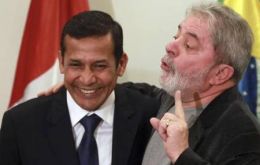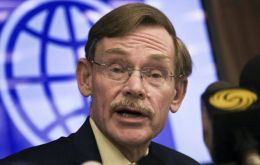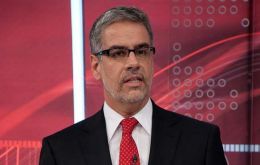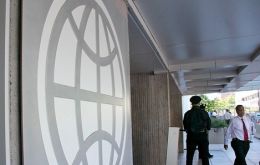MercoPress. South Atlantic News Agency
Tag: World Bank
-
Wednesday, November 2nd 2011 - 20:54 UTC
Brazil receives 8bn dollars loan to lift another 16 million people from ‘misery’

Brazil will receive 8 billion dollars in financing from the World Bank to push its campaign to uproot extreme hardship deeper into some of the country's poorest areas, the bank said on Wednesday.
-
Thursday, October 27th 2011 - 05:58 UTC
World Bank forecasts Latam growth of 3.5% to 4% this year and 4% in 2012

Latin America’s economy is forecasted to grow between 3.5% and 4% this year, which is less than previous estimates before the current global financial crisis, said World Bank representative for the region, Pamela Cox.
-
Thursday, October 27th 2011 - 05:52 UTC
In anticipation of global crisis World Bank extends 260m loan to Uruguay

The World Bank Board approved a 260 million dollars loan to support the Uruguayan government’s reform program in order to consolidate growth with social equity and provide a line of financing to address the impact of the current uncertainty in global economic affairs.
-
Thursday, October 27th 2011 - 05:37 UTC
Praise and dollars from the World Bank to Peruvian president Humala

The World Bank has offered a 3 billion dollars line of credit to Peru, backing President Ollanta Humala's plans for anti-poverty initiatives and sustained economic growth, a regional vice president said this week.
-
Monday, October 10th 2011 - 07:58 UTC
Paris Club group lays out terms for Argentina to repay defaulted debt

Members of the Paris Club group of creditors want Argentina to repay an estimated 9 billion dollars in defaulted debt within three years and to make a big initial payment, Buenos Aires newspaper La Nacion reported over the weekend.
-
Sunday, October 9th 2011 - 07:23 UTC
World Bank calls on Germany to take stronger political leadership in Euro crisis

The World Bank has called on Germany to take a stronger political leadership role in Europe in order to end the Euro zone debt crisis.
-
Thursday, September 29th 2011 - 16:17 UTC
US decision to vote against loans for Argentina “will not affect funding for 2012”

Washington's decision to vote against loans for Argentina from multilateral development banks “will not affect the country's funding for 2012”, an Argentine government source said on Wednesday.
-
Thursday, September 29th 2011 - 00:40 UTC
‘Why support Argentina financially when the country threatens Falklands?’

Why should the UK support Argentina financially when the country is acting against British interests particularly in issues such as the Falkland Islands, asks an article in the Mail-online.
-
Thursday, September 29th 2011 - 00:12 UTC
US will vote against loans to Argentina in World Bank and IDB

The US State Department said on Wednesday that Argentina must normalize relations with creditors. The statement follows an announcement last week from the Treasury Department warning that the US will vote against granting loans to Argentina in multilateral organizations.
-
Tuesday, September 27th 2011 - 05:58 UTC
World Bank reminds Argentina of G20 duties and urges payment of defaulted debts

Argentina should pay its debt with the Paris Club group of creditor nations if it wants to continue receiving foreign investment, said Paolo Martelli, director for Latin America of the World Bank’s International Finance Corp, reports Buenos Aires daily La Nación.
